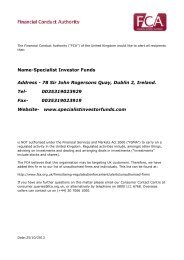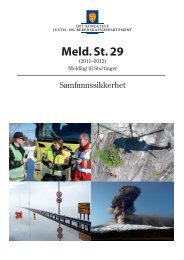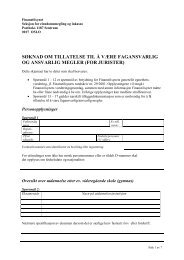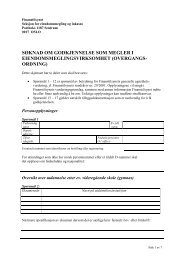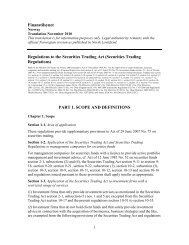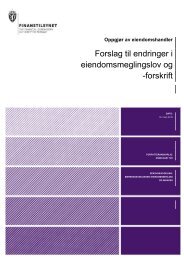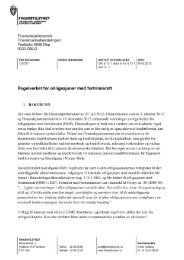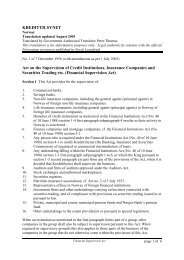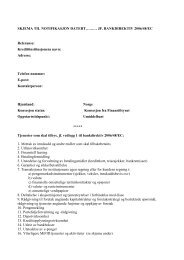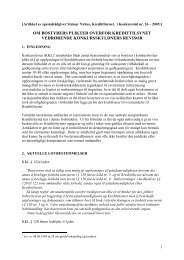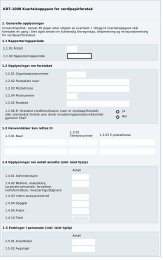Rapport om gjennomføring av AIFMD i norsk rett - Finanstilsynet
Rapport om gjennomføring av AIFMD i norsk rett - Finanstilsynet
Rapport om gjennomføring av AIFMD i norsk rett - Finanstilsynet
You also want an ePaper? Increase the reach of your titles
YUMPU automatically turns print PDFs into web optimized ePapers that Google loves.
EN<br />
L 174/6 Official Journal of the European Union 1.7.2011<br />
(36) The C<strong>om</strong>mission is invited to examine the possibilities of<br />
putting forward an appropriate horizontal legislative<br />
proposal that clarifies the responsibilities and liabilities<br />
of a depositary and governs the right of a depositary<br />
in one Member State to provide its services in another<br />
Member State.<br />
(37) The depositary should be responsible for the proper<br />
monitoring of the AIF’s cash flows, and, in particular,<br />
for ensuring that investor money and cash belonging<br />
to the AIF, or to the AIFM acting on behalf of the AIF,<br />
is booked correctly on accounts opened in the name of<br />
the AIF or in the name of the AIFM acting on behalf of<br />
the AIF or in the name of the depositary acting on behalf<br />
of the AIF for the safe-keeping of the assets of the AIF,<br />
including the holding in custody of financial instruments<br />
that can be registered in a financial instruments account<br />
opened in the depositary’s books and all financial<br />
instruments that can be physically delivered to the<br />
depositary, and for the verification of ownership of all<br />
other assets by the AIF or the AIFM on behalf of the AIF.<br />
When ensuring investor money is booked in cash<br />
accounts, the depositary should take into account the<br />
principles set out in Article 16 of C<strong>om</strong>mission<br />
Directive 2006/73/EC of 10 August 2006 implementing<br />
Directive 2004/39/EC of the European Parliament and of<br />
the Council as regards organisational requirements and<br />
operating conditions for investment firms and defined<br />
terms for the purposes of that Directive ( 1 ).<br />
(38) A depositary should act honestly, fairly, professionally,<br />
independently and in the interest of the AIF or of the<br />
investors of the AIF.<br />
(39) It should be possible for a depositary to delegate the safe-<br />
keeping of assets to a third party which, in its turn,<br />
should be able to delegate that function. However,<br />
delegation and sub-delegation should be objectively<br />
justified and subject to strict requirements in relation to<br />
the suitability of the third party entrusted with the<br />
delegated function, and in relation to the due skill, care<br />
and diligence that the depositary should employ to select,<br />
appoint and review that third party.<br />
(40) A third party to wh<strong>om</strong> the safe-keeping of assets is<br />
delegated should be able to maintain a c<strong>om</strong>mon<br />
segregated account for multiple AIFs, a so-called<br />
‘<strong>om</strong>nibus account’.<br />
(41) Entrusting the custody of assets to the operator of a<br />
securities settlement system as designated for the<br />
purposes of Directive 98/26/EC of the European<br />
Parliament and of the Council of 19 May 1998 on<br />
( 1 ) OJ L 241, 2.9.2006, p. 26. ( 2 ) OJ L 166, 11.6.1998, p. 45.<br />
settlement finality in payment and securities settlement<br />
systems ( 2 ) or entrusting the provision of similar services<br />
to third-country securities settlement systems should not<br />
be considered to be a delegation of custody functions.<br />
(42) The strict limitations and requirements to which the<br />
delegation of tasks by the depositary is subject should<br />
apply to the delegation of its specific functions as a<br />
depositary, namely the monitoring of the cash flow,<br />
the safe-keeping of assets and the oversight functions.<br />
Delegation of supporting tasks that are linked to its<br />
depositary tasks, such as administrative or technical<br />
functions performed by the depositary as a part of its<br />
depositary tasks, is not subject to the specific limitations<br />
and requirements set out in this Directive.<br />
(43) This Directive also takes account of the fact that many<br />
AIFs, and in particular hedge funds, currently make use<br />
of a prime broker. This Directive ensures that AIFs may<br />
continue to use the function of prime brokers. However,<br />
unless it has functionally and hierarchically separated the<br />
performance of its depositary functions fr<strong>om</strong> its tasks as<br />
prime broker and the potential conflicts of interest are<br />
properly identified, managed and disclosed to the<br />
investors of the AIF, no prime broker should be<br />
appointed as a depositary, since prime brokers act as<br />
counterparties to AIFs and therefore cannot at the<br />
same time act in the best interest of the AIF as is<br />
required of a depositary. Depositaries should be able to<br />
delegate custody tasks to one or more prime brokers or<br />
other third parties. In addition to the delegated custody<br />
tasks prime brokers should be allowed to provide prime<br />
brokerage services to the AIF. Those prime brokerage<br />
services should not form part of the delegation<br />
arrangement.<br />
(44) The depositary should be liable for the losses suffered by<br />
the AIFM, the AIF and the investors. This Directive distinguishes<br />
between the loss of financial instruments held in<br />
custody, and any other losses. In the case of a loss other<br />
than of financial instruments held in custody, the<br />
depositary should be liable in the case of intent or<br />
negligence. Where the depositary holds assets in<br />
custody and those assets are lost, the depositary should<br />
be liable, unless it can prove that the loss is the result of<br />
an external event beyond its reasonable control, the<br />
consequences of which would h<strong>av</strong>e been un<strong>av</strong>oidable<br />
despite all reasonable efforts to the contrary. In this<br />
context, a depositary should not, for example, be able<br />
to rely on internal situations such as a fraudulent act by<br />
an employee to discharge itself of liability.<br />
(45) Where the depositary delegates custody tasks and the<br />
financial instruments held in custody by a third party<br />
are lost, the depositary should be liable. However,<br />
provided that the depositary is expressly allowed to<br />
discharge itself of liability subject to a contractual




